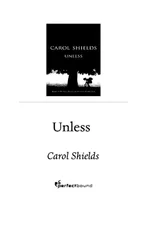She became loud and shrewish. When his silent followers arrived at their door—and in time there were thousands of them, each with the same blank face and gold armband—she admitted them with bad grace. She grew garrulous. She rambled on and on, bitter and blaming, sometimes incoherent, sometimes obscene, sometimes reverting to a coarse, primitive schoolyard Spanish, sometimes shouting to herself or cursing into the mirror or chanting oaths—anything to furnish the emptiness of the house with words. She became disoriented. The solid plaster of the walls fell away from her, melting into a drift of vapor. There seemed to be no shadows, no sense of dimension, no delicate separation between one object and another. Privately, she pleaded with her husband for an act of apostasy. Later she taunted him. “Show me you’re still human,” she would say. “Give me just one word.” The word betrayal came frequently out of her wide mobile mouth, and so did the scornful epithet martyr .
But time passes and people forget. She forgot, finally, what it was that had betrayed her. Next she forgot her husband’s name. Sometimes she forgot that she had a husband at all, for how could anything be said to exist, she asked herself loudly, hoarsely—even a husband, even one’s self—if it didn’t also exist in the shape of a word.
He worried that she might be arrested, but for some reason—his position probably—she was always let off with a warning. In their own house she ignored him, passing him on the stairs without a look, or crossing in front of him as though he were a stuffed chair. Often she disappeared for hours, venturing out alone into the heat of the night, and he began to suspect she had taken a lover.
The thought preyed on him, though in fact he had long since forgotten the word for wife and also the word for fidelity . One night, when she left the house, he attempted to follow her, but clearly she was suspicious because she walked very quickly, looking back over her shoulder, making a series of unnecessary turns and choosing narrow old streets whose curbs were blackened by fire. Within minutes he lost sight of her; soon after that he was driven back by the heat.
The next night he tried again, and this time he saw her disappear into an ancient, dilapidated building, the sort of enclosure, he remembered, where children had once gone to learn to read and write. Unexpectedly, he felt a flash of pity; what a sad place for a tryst. He waited briefly, then entered the building and went up a flight of smoldering stairs that seemed on the point of collapse. There he found a dim corridor, thick with smoke, and a single room at one end.
Through the door he heard a waterfall of voices. There must have been a dozen people inside, all of them talking. The talk seemed to be about poetry. Someone—a woman—was giving a lecture. There were interruptions, a discussion, some laughter. He heard his wife’s voice, her old gilt-edged contralto, asking a question, and the sound of it made him draw in his breath so sharply that something hard, like a cinder or a particle of gravel, formed in his throat.
It stayed stubbornly lodged there all night. He found it painful to breath, and even Isobel noticed how he thrashed about in bed, gasping wildly for air. In the morning she called a doctor, who could find nothing wrong, but she remained uneasy, and that evening she stayed home and made him cups of iced honey-and-lemon tea to ease his throat. He took her hand at one point and held it to his lips as though it might be possible to find the air he needed inside the crevices of her skin. By now the scraping in his throat had become terrible, a raw agonizing rasp like a dull knife sawing through limestone. She looked at his face, from which the healthy, blood-filled elasticity had gone and felt herself brushed by a current of air, or what might have been the memory of a name.
He began to choke violently, and she heard something grotesque come out of his mouth, a sound that was only half-human, but that rode on a curious rhythmic wave that for some reason stirred her deeply. She imagined it to be the word Isobel . “Isobel?” she asked, trying to remember its meaning. He said it a second time, and this time the syllables were more clearly formed.
The light of terror came into his eyes, or perhaps the beginning of a new fever; she managed to calm him by stroking his arm. Then she called the children inside the house, locked the doors and windows against the unbearable heat, and they began, slowly, patiently, hands linked, at the beginning where they had begun before—with table, chair, bed, cool, else, other, sleep, face, mouth, breath, tongue.
ON OUR WAY TO CATCH the Portsmouth ferry, Dobey and I stayed overnight at a country hotel in the village of Kingsclere. The floors sloped, the walls tipped, the tap leaked rusty water and the bedclothes gave out an old, bitter odor.
At breakfast we were told by the innkeeper that King John had once stayed in this hotel and, moreover, had slept in the very room where we had spent the night.
“Wasn’t he the Magna Carta king?” Dobey said, showing off. “That would make it early thirteenth century.”
“Incredible,” I said, worrying whether I should conceal my fried bread beneath the underdone bacon or the bacon beneath the bread. “Extraordinary.”
The innkeeper had more to tell us. “And when His Royal Highness stopped here, he was bit by a bedbug. Of course, there’s none of that nowadays.” Here he chuckled a hearty chuckle and sucked in his red cheeks.
I crushed my napkin—Dobey would call it a serviette—on top of my bacon and fried bread and egg yolk and said to myself: next he’ll be rattling on about a ghost.
“And I didn’t like to tell you people last night when you arrived,” the innkeeper continued, “but the room where the two of you was—it’s haunted.”
“King John?” I asked.
“One of the guards, it’s thought. My wife’s seen ‘im many the time. And our Barbara. And I’ve heard ‘im clomping about in his great boots in the dark of the night and making a right awful noise.”
Dobey and I went back to our room to brush our teeth and close our haversacks, and then we lay flat on our backs for a minute on the musty bed and stared at the crooked beams.
“Are you thinking kingly thoughts?” I said after a while.
“I’m thinking about those poor bloody Aussies,” said Dobey.
“Oh, them,” I said. “They’ll make out all right.”
Only the day before we’d picked up the two Australians on the road. Not that they were by any stretch your average hitchhikers—two women, a mother, middle-aged, and a grown daughter, both smartly dressed. Their rented Morris Minor had started to smoke between Farrington and Kingsclere, and we gave them a lift into the village.
They’d looked us over carefully, especially the mother, before climbing into the back seat. We try to keep the back seat clean and free of luggage for our hitchhikers. The trick is to put them at their ease so they’ll talk. Some we wring dry just by keeping quiet. For others we have to prime the pump. It’s like stealing, Dobey says, only no one’s thought to make a law against it.
Within minutes we knew all about the Australians. They were from Melbourne. The mother had recently been widowed, and her deceased husband, before the onset of Addison’s disease, had worked as an investment analyst. Something coppery about the way she said “my late husband” suggested marital dullness, but Dobey and I never venture into interpretation. The daughter taught in a junior school. She was engaged to be married, a chap in the military. The wedding was six months away, and the two of them, mother and daughter, were shoring themselves up by spending eight weeks touring Britain, a last fling before buckling down to wedding arrangements. It was to be a church ceremony, followed by a lobster lunch in the ballroom of a large hotel.
Читать дальше












